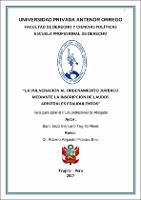La vulneración al ordenamiento jurídico mediante la inscripción de laudos arbitrales fraudulentos

View/
Download
(application/pdf: 2.283Mb)
(application/pdf: 2.283Mb)
Date
2017Author(s)
Trujillo Flores, Enzo Giancarlo
Metadata
Show full item recordAbstract
Durante los últimos años, nuestro ordenamiento jurídico se ha visto vulnerado ante las diversas
modalidades de fraude que se vienen dando en las transferencias de bienes inmuebles, en la que,
organizaciones delictivas están apropiándose de bienes ajenos a través de procesos arbitrales
fraudulentos; para ello, se amparan en el soporte jurídico que tiene el laudo arbitral, el cual no
está sujeto a calificación por parte del registrador público; en consecuencia, se procede con la
inscripción del mismo en el registro. Por lo que, esta situación estaría contraviniendo el derecho
a la propiedad que goza toda persona, consagrado en el inciso 16 del artículo 2º de nuestra
Constitución Política.
Es así que, el Reglamento de Inscripciones del Registro de Predios (resolución N° 097-2013-
SUNARP-SN), establece en el tercer párrafo del artículo 9° que: “El registrador no podrá
evaluar la competencia del Tribunal Arbitral o Arbitro Único para laudar, el contenido del laudo,
ni la capacidad de los árbitros para ejecutarlo. Tampoco podrá calificar la validez del acuerdo
arbitral ni su correspondencia con el contenido del laudo”. Asimismo, el Precedente de
Observancia Obligatoria (resolución Nº 382-2012-SUNARP/PT) adopta un criterio firme, en la
que, su sustento se basa en un acto sobre Prescripción Adquisitiva de Propiedad declarada por
Árbitro Unipersonal (resolución N° 110-2012-SUNARP-TR-T). During the last years, our Legal System has been violated by the various forms of fraud that
have been occurring in the transfers of immovable property, in which, criminal organizations
are appropriating foreign assets through fraudulent arbitration proceedings; For this purpose, are
protected in the legal support that has the arbitration award, which is not subject to any
observation by the public registrar; consequently, proceed with the registration of the same in
the registry. So that, this situation would be in contravention of the right to property enjoyed by
all persons, enshrined in paragraph 16 of Article 2º of our Constitution.
It is so, the Regulation of Registration of the Register of Buildings (resolution Nº 097-2013-
SUNARP-SN), establishes in the third paragraph of Article 9 that: ““The registrar shall not be
able to evaluate the competence of the Arbitral Tribunal or Arbitrator to clarify, the content of
the award, nor the ability of the arbitrators to execute it. Nor can it qualify the validity of the
arbitration agreement nor its correspondence with the content of the award““. Likewise, the
Precedent of Compulsory Enforcement (resolution Nº 382-2012-SUNARP/PT) adopts a firm
criterion, in which, its support is based on an Act on the Prescription of Property Acquisition
declared by Unipersonal Arbitrator (resolution No. 110-2012 -SUNARP-TR-T).
Collections
- Derecho [481]

